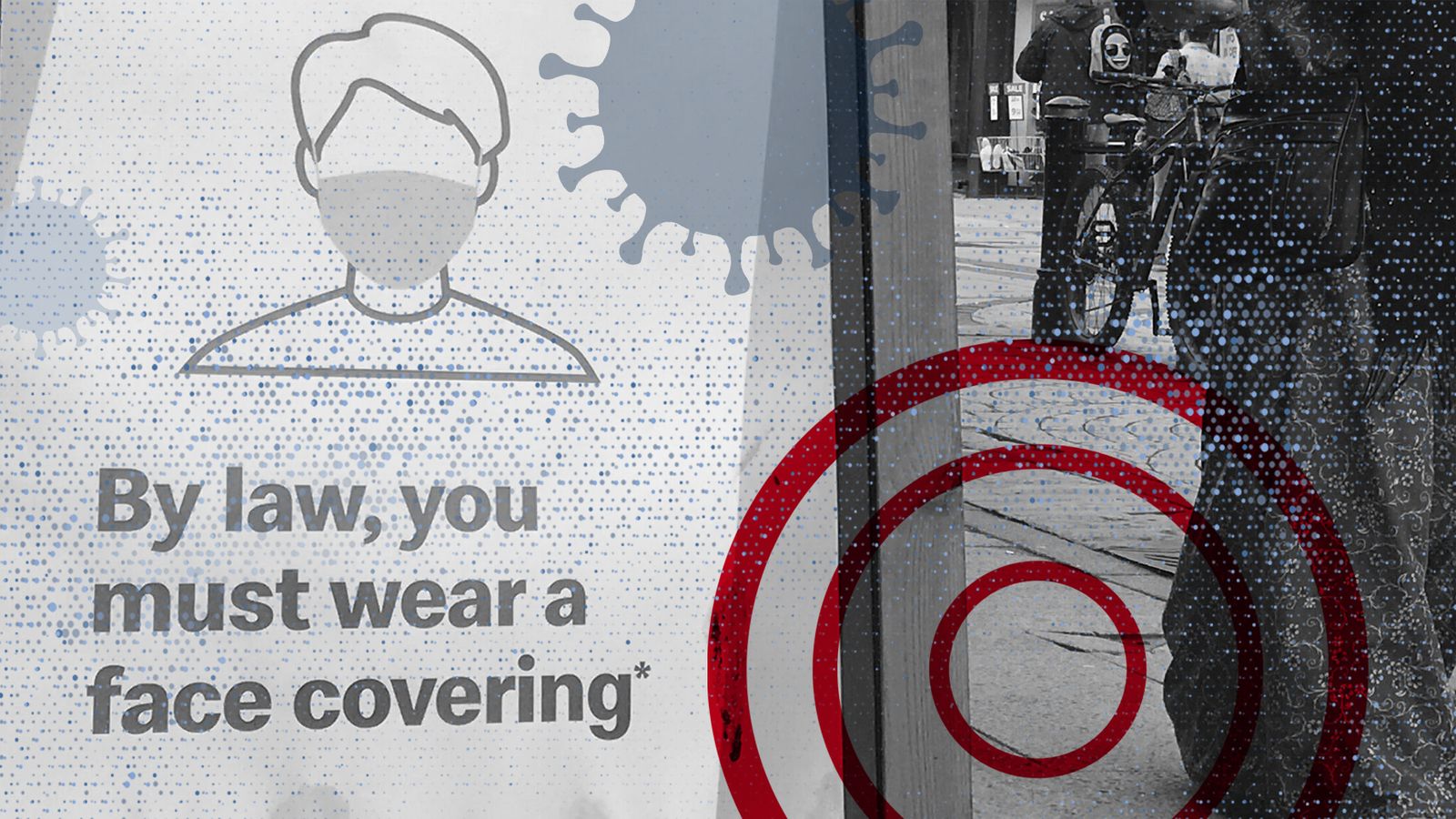Doctors are urging the government to enforce Plan B measures in England as coronavirus infections rise in the weeks leading up to winter.
The strategy includes measures already being imposed by other UK nations as they seek to control the spread of the virus – with varying degrees of success.
Here we take a look at each UK nation, the measures they have in place and the rate of infections there.
England:
Face masks and social distancing have been a legal requirement only in health and social care settings since 19 July. However, the government does still encourage the wearing of face coverings in crowded and enclosed areas.
All areas of hospitality have reopened, and unlike in Wales and Scotland where COVID passes are compulsory, venues can decide whether or not ask for proof of a negative test, full vaccination or immunity from a recent infection.
Hospitality venues such as pubs, restaurants and bars are also no longer required to provide table service or follow other social distancing rules.
COVID-19: Boris Johnson admits cases are ‘high’ but insists ‘we’re sticking with our plan’
Tony Blair: Getting vaccine is ‘civic duty’ and govt should bump boosters to 500,000 a day
COVID-19: Confusion as minister says book booster jabs but NHS says people must be invited
Government figures show England’s seven-day rolling case rate has steadily increased throughout October.
The figures show the rate of people with at least one positive COVID-19 test result, either lab-reported or by lateral flow device, per 100,000 population averaged over a seven-day period.
The infection rate was 47.95 on 1 October, 51.1 on 7 October, and 62.36 on 14 October. On 19 October, the most recent date with figures available, it was 57.9.
However, after 14 October figures are unreliable because of the way the government gathers the information.
Scotland
Vaccine passports have been mandatory in nightclubs and for large events in Scotland since 1 October.
Such certification would become mandatory in certain scenarios in England if the government’s Plan B strategy were to be introduced.
People in Scotland are also legally obliged to wear face coverings in most indoor public places.
The seven-day case rate in Scotland has slightly fallen or remained steady throughout this month, with the rate at 45.81 on 1 October, 44.12 on 7 October , 44.47 on 14 October, and 39.79 on 19 October.
It needs to be remembered that the rates for after 14 October are subject to change.
However, the figures for October in Scotland suggest measures may be having an effect.
Wales
Since 11 October, people in Wales have been required to show an NHS COVID pass to prove they are either fully vaccinated, or have had a recent negative test, to nightclubs and indoor and outdoor non-seated events with large crowds.
Like Scotland, but unlike England, face coverings are mandatory in most indoor public places in Wales.
The seven-day case rate in Wales remained steady in the weeks leading up to 1 and 7 October, before increasing in the week up to 14 October.
The rates are also higher than in England where these restrictions are not in place – with a rate of 73.38 reported on 1 October, a rate of 74.56 on 7 October, and 84.7 on 14 October. In the week up to 19 October it had fallen to 75.25 – but this figure is not reliable.
Please use Chrome browser for a more accessible video player
Northern Ireland
Northern Ireland, like England, has not introduced COVID passes to get into nightclubs or indoor events. However, indoor gatherings of more than 15 people do require a risk assessment to have taken place.
Restrictions are slightly tighter than in England, as face masks are required in all indoor settings.
The case rate has steadily risen and in the seven days leading up to 1 October was 56.47, while on 7 October it was 62.08, and 14 October it was 68.21.
Should England enforce its Plan B strategy?
Scotland is the only country where the infection rate has either gone down or remained steady each week – suggesting England could benefit from such measures.
However, Wales has very similar measures to Scotland but has a much higher case rate which rose steadily throughout October.
Dr Bharat Pankhania, an infectious diseases expert at the University of Exeter, told Sky News the difference in rates in spite of similar measures is due to compliance.
He said: “It’s all very well saying ‘these are the regulations’, but they are pointless unless they are absolutely complied with, so compliance is a big element of it.”
Dr Pankhania continued: “In Scotland they are strict with isolation in the home when there is a case. If 70% of people, or even 50% of people follow the compliance code, then you get a better result compared to loose controls.
“The rules in Scotland are pretty strict.”
Dr Pankhania also believes England should enforce its Plan B strategy, adding: “I don’t refer to is as Plan B, I just refer to it as the plan, because nobody has explicitly told us what Plan B is, but I surmise that as case numbers go up, meaning there is more infection in the community, then of course you should take early and extensive counter measures.
“Reacting late equals half-hearted control measures and half-hearted results.”






















